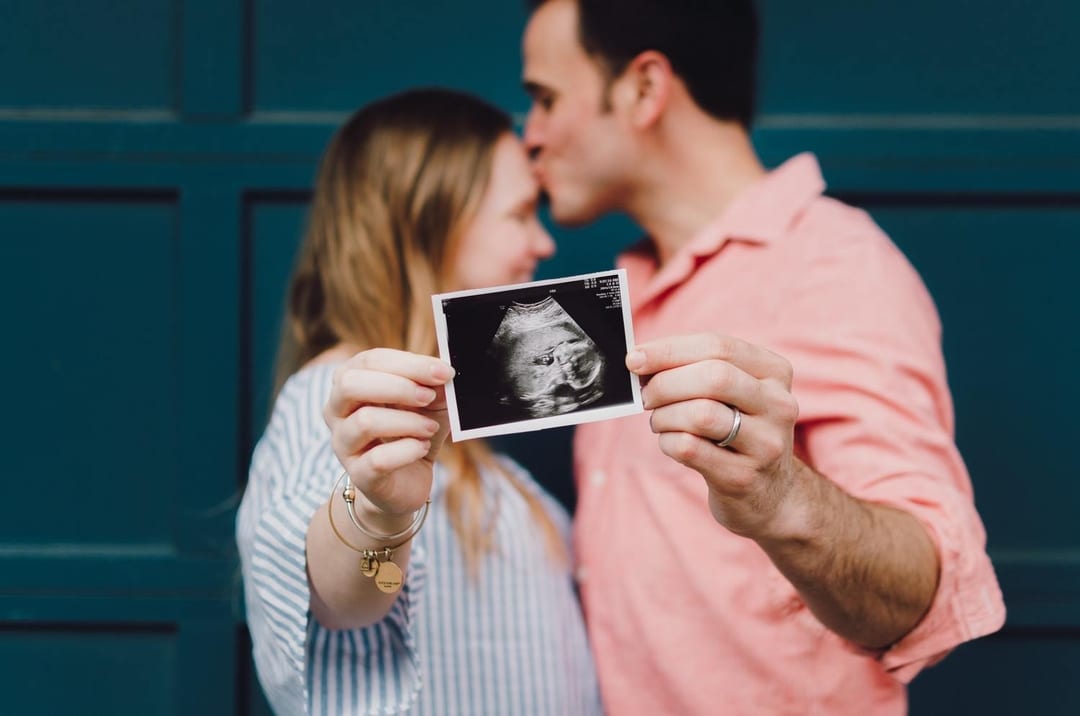
When to Announce Your Pregnancy
|
|
Time to read 7 min
|
|
Time to read 7 min
The moment a pregnancy test reveals you are pregnant, you may feel the need to shout it from the rooftops! Seeing that positive pregnancy test is genuinely thrilling.
While ultimately it is up to the parents to decide when to share the happy news with family members and friends, there are some things to consider first.
In this article, we gathered some professional medical advice to help you make an informed decision on when to announce your pregnancy.

Anyone who has access to social media has likely seen their fair share of pregnancy announcements throughout the years. Some couples announce the big news a few weeks into their pregnancy, while others may not make a peep online until their third trimester. And it’s not only just social media people have to consider, but also when and how to tell close family members and friends.
At 6 weeks, you probably just discovered you are pregnant and may not be ready to make any announcements; you may not have even told your partner yet. Since pregnancy officially begins on the start date of your last menstrual period, most people won’t have a positive result until week four of their pregnancy.
It’s also possible that your doctor won’t schedule an appointment until at least week eight because of the risk of miscarriage before week twelve, unless you qualify as a high-risk pregnancy. According to March of Dimes, most miscarriages occur before the 12-week mark, and 10-15% of all pregnancies end in miscarriage.
However, there may be some reasons you need to reveal your news early in the first trimester. In this article you can learn about some of the most common symptoms in early pregnancy, including morning sickness, fatigue, and frequent urination.
Depending on the severity of your symptoms or your work situation, for example, if you are a teacher who will need extra bathroom visits, you may feel it is necessary to clue some close friends or coworkers into what is happening.
Another reason to consider an early announcement is if you will need a strong support network. For example, first-time moms, single parents, high-risk pregnancies, or partners of deployed spouses may need to line up their support team early on to ensure they have the help they need.
At the end of week twelve, you are about to cross into the second trimester, the point at which most medical professionals say it’s safe to make your announcement. After week twelve, the risk of miscarriage drops from 10-15% to only 1-5%.
Additionally, after week ten, pregnant women are eligible to have noninvasive prenatal testing (NIPT) done. NIPT is a prenatal test that detects specific genetic abnormalities via a blood sample. The primary condition it looks for is Down syndrome. If you have a family history of chromosomal disorders or are over the age of thirty-five, you may wish to have this test completed before your announcement.
By the end of the first trimester, you will have had a few prenatal visits, heard your baby’s heartbeat, had plenty of time for the news to settle in, and are aware of any early pregnancy complications that could pop up. Thus, the general consensus is that most people wait until weeks 13 or 14 to publicize their big announcement, although you’ve likely told a few loved ones by this point.




Despite your excitement, there may be some situations when you should wait to make your announcement. One of the biggest reasons some couples wait to share their news is if they have experienced a previous pregnancy loss or struggled with infertility.
Couples who have experienced these unfortunate events may feel timid about making a big announcement in case something should go wrong.
Miscarrying is much more common than most people realize,but is difficult for many couples to talk about. If you are expecting a new baby after a miscarriage, it may feel safer to keep the news to yourself until you are firmly into the second trimester.
The risk of miscarriage and congenital disabilities also increases with age. Some couples decide to terminate a pregnancy if severe congenital disabilities are discovered through amniocentesis, performed between weeks sixteen to eighteen.
Amniocentesis is a procedure that is typically recommended for women over 35 or those whose families have a history of congenital defects or abnormalities.
A final reason a person may delay a pregnancy announcement is fear of workplace discrimination. Even though pregnancy discrimination is illegal, it still happens and is more common than you may think!
Some people fear they’ll miss out on promotions, projects, or other opportunities if their boss discovers their pregnancy.
No matter when you decide to make your special announcement, Nurture& can help you prepare for this exciting time in your life. Our beautiful and comfortable pieces are ideal for your nursery, home, and growing family.


